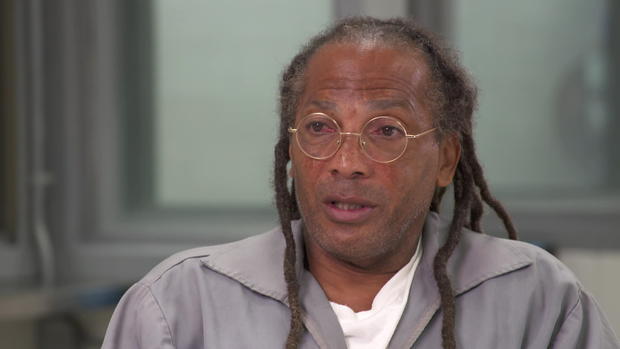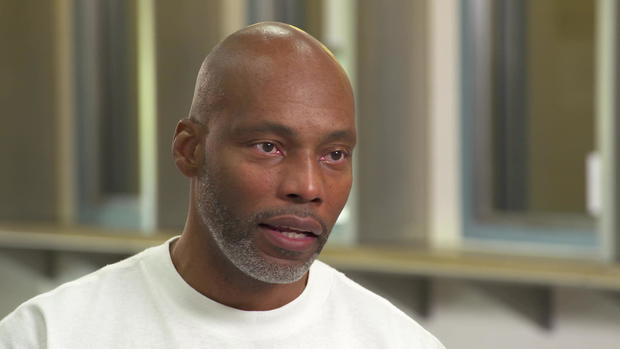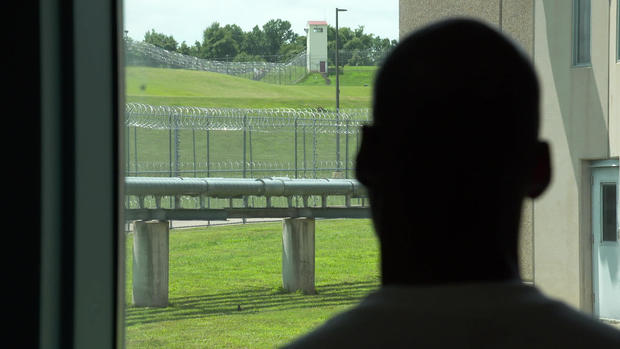Last May, something extraordinary happened in a Missouri courthouse: Jean Peters Baker, the Jackson County prosecutor, issued a public apology to a man she believes was wrongfully convicted.
"My job is to apologize," she said. "It is important to recognize when the system has made wrongs … and what we did in this case was wrong.
"So, to Mr. Strickland, I am profoundly sorry."
"48 Hours" correspondent Erin Moriarty asked Kevin Strickland what was going through his mind when he heard the prosecutor's statement.
"Oh, today's gonna be the day," he said. "They're gonna call me and tell me, 'Pack your stuff up. You're going home.'"
Strickland, sentenced to life without parole in 1979 for a triple murder, has waited a lifetime to hear those words.
Moriarty asked, "How old was your daughter when you came in here?"
"Seven weeks old," he replied.
"So, you've missed watching her grow up?"
"Every bit of it."
"How old is she now?"
"She just turned 43."
But an apology, even from the prosecutor, is all he gets, Strickland is still in prison.
"It's a great deal of pain in here," he said, "of knowing what I done missed out on and my opportunities in life. I'm trying to pick my words because I don't want to offend anybody, but I'm hurting. I'm really hurting. "
And shockingly, his situation is not unique in Missouri.
Forty-seven-year-old Lamar Johnson was convicted of the murder of Marcus Boyd in 1994.
"What have you lost over the last 26 years?" Moriarty asked.
"Time," Johnson said. "There's a closeness between, especially with a father and his daughters, and I missed that. I missed being able to be a part of their life."
For more than two decades, Johnson has insisted he was wrongfully convicted. "I did not kill Marcus. He was one of my best friends and I loved him."
Two years ago, the top prosecutor for the city of St. Louis, Kim Gardner, agreed with him, and filed a motion for Johnson's release based on what she called "overwhelming evidence of innocence." Yet, Johnson, too, remains behind bars.
"We have a longstanding so-called innocence problem here in Missouri," said Lindsay Runnels, Johnson's attorney. "It doesn't stop and start with Lamar Johnson and Kevin Strickland. It's decades old and administrations old."
Runnels and Trish Rojo Bushnell, Strickland's lawyer, point out that, in both cases, the real killers pleaded guilty, and have already served their time for the murders.
Moriarty asked, "How unusual is it in these cases that you, as defense attorneys, are in complete agreement with the prosecutors that your clients are innocent?"
"In Missouri, it's absolutely unusual," said Bushnell. "I can't think of another instance in which we've experienced that."
And in most states, when the prosecutor and defense attorney are in agreement, the inmate is released.
So, what's going on in the state of Missouri?
Gardner said, "I thought that when a prosecutor finds this overwhelming evidence of Lamar Johnson's innocence, that good people would react and do the right thing. But unfortunately, that was not done in this case."
Gardner's office created a conviction integrity unit five years ago to investigate cases like Johnson's. "What we uncovered was devastating, not only to myself, but to the criminal justice system," she said.
Johnson was accused of being one of two men who shot Marcus Boyd. Both were wearing ski masks on a dark night. There was an eyewitness who initially told investigators that he couldn't see the faces of the shooters, but then he later identified Johnson as one of them.
"I didn't believe it," said Johnson. "He told me that I had been identified, and I just didn't believe it."
"Is there any evidence, physical evidence, that ties you to the death of Marcus Boyd?" asked Moriarty.
"No physical evidence. There's not even a motive. At my trial they did not even present a motive. They never explained why I supposedly did this."
In her June 2019 motion asking for Johnson's release, Gardner said that the only eyewitness, who tied Johnson to the murder, had recanted and admitted he had been pressured to lie by investigators. What's more, Gardner's office said it uncovered proof that the eyewitness had been paid thousands of dollars by detectives … a fact kept from Johnson's attorneys.
Gardner concluded that much of the evidence presented at Johnson's 1995 trial was "false and perjured."
At a 2019 press conference Gardner said, "This man lost 25 years of his life. We all lost. We have victims who lost. We let everyone down. And that's what it's about. It's about justice and trust in a system, a system of fairness for all."
But the Attorney General of Missouri, Eric Schmitt, successfully fought the motion, arguing that because Johnson's verdict was final and he had run out of appeals, prosecutors like Gardner don't have the power to ask for his release.
"It's not the merits that's ever challenged, it's the procedure that's challenged. 'They're too late,' the Attorney General argues," said Runnels.
"Lindsay, are you saying that a completely innocent human being could stay in prison because he or she missed a deadline?" asked Moriarty.
"Yes," she replied, "and it happens, frequently."
Sean O'Brien, a law professor at the University of Missouri Kansas City, said, "I do know that the Attorney General's office, for a long time, has had a practice of opposing every case regardless of its merit. They think that their duty is to defend every judgment, no matter the justice of it."
"Even with new evidence that shows that the wrong person was convicted?" asked Moriarty.
"Even with new evidence," he replied.
Gardner appealed, but this past March, the Missouri Supreme Court ruled against her, stating that, "This case is not about whether Johnson is innocent … This case presents only the issue of whether there is any authority to appeal … No such authority exists."
Johnson said, "It was disappointing and devastating. We're talking about a life here, you know, somebody who's been in prison for 26 years."
Kevin Strickland said, "They refuse to acknowledge the truth, the real truth. I wasn't there."
As for Strickland, Attorney General Schmitt is fighting his release as well – and just this week filed a new brief insisting Strickland got a fair trial.
Bushnell said, "We have a system that cares so much about finality over fairness, that we have an innocent person that we have known for decades is innocent, and is still sitting there today."
Schmitt declined a request by "Sunday Morning" for an interview.
For now, both men say they are trapped in a baffling legal limbo.
Moriarty said, "It sounds like you've lost that hope that got you through this so far."
Johnson said, "The problem is, I don't know what else to do. I mean, what else is needed? The only thing that's that I haven't been able to present is DNA.
"And God, I wish there was some DNA," he said, crying. "I'm sorry."
"Please do not apologize," Moriarty said.
Missouri Governor Mike Parson has the power to pardon both men, but has so far declined to do so.
And then there's this: State legislators just passed a law that will soon allow prosecutors like Kim Gardner to request a hearing for innocent inmates, but it's still no guarantee of freedom.
Sean O'Brien said, "In every exoneration I've been involved in, I come away with the same impression: It was way too easy to convict, and way harder than it should have been to correct that conviction."
If and when Johnson and Strickland are released, neither will receive any compensation.
Moriarty said, "Is there any way that the state of Missouri can make you whole?"
"Nothing they could do," Strickland replied. "If they gave me the state of Missouri and evicted everybody, that wouldn't make me whole. I need 43 years back."
Johnson said, "I just want to be free, to have the ability to enjoy the small things."
"What is the first thing you'd want to do if you got out?"
"Hug my mother," Johnson said. "I'd like for her to know that truth finally prevailed, and she doesn't have to know that I had to spend the rest of my life in prison for something I didn't do."
For more info:
Story produced by Sari Aviv. Editor: George Pozderec.
"still" - Google News
July 18, 2021 at 08:49PM
https://ift.tt/3z7ad2H
Why are wrongly-convicted people still imprisoned in Missouri? - CBS News
"still" - Google News
https://ift.tt/35pEmfO
https://ift.tt/2YsogAP
Bagikan Berita Ini

















0 Response to "Why are wrongly-convicted people still imprisoned in Missouri? - CBS News"
Post a Comment